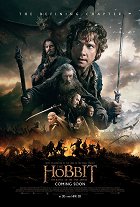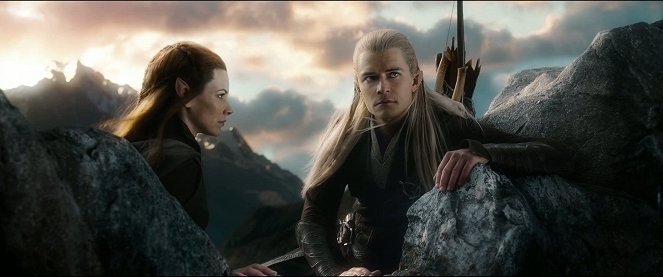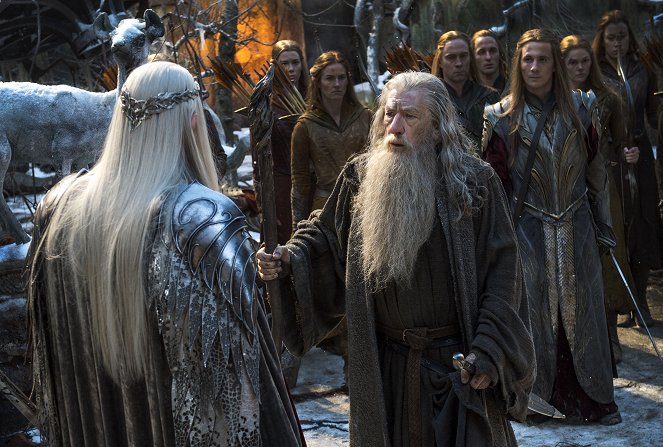Directed by:
Peter JacksonCinematography:
Andrew LesnieComposer:
Howard ShoreCast:
Martin Freeman, Ian McKellen, Richard Armitage, Luke Evans, Evangeline Lilly, Orlando Bloom, Hugo Weaving, Cate Blanchett, Christopher Lee (more)VOD (4)
Plots(1)
"The Hobbit: The Battle of the Five Armies" brings to an epic conclusion the adventures of Bilbo Baggins (Martin Freeman), Thorin Oakenshield (Richard Armitage) and the Company of Dwarves. The Dwarves of Erebor have reclaimed the vast wealth of their homeland, but now must face the consequences of having unleashed the terrifying Dragon, Smaug, upon the defenseless men, women and children of Lake-town. (Warner Bros. US)
(more)Videos (20)
Reviews (15)
The most concise and balanced film of the whole trilogy, which did not dispel any of my doubts that accompanied me through The Hobbit. Despite all the convulsive emphasis on being epic, the trilogy is unfortunately very flat, it lacks truly interesting, structured characters (in fact, the only one who goes through any dramatic change besides Bilbo is Thorin), the supplied storylines are horribly shallow and the three films did not add depth, but rather amusement park-like, uncritically long action scenes. The Battle of the Five Armies itself surprises, because even after Gondor and Helm's Deep, PJ was able to create fresh, well-arranged and choreographically imaginative giant scenes (an army of dwarves and a redheaded janitor Willy on a giant pig are among the last few things I wanted to see in my life). Unfortunately, from the moment the giant chamoises unexpectedly appear on the screen, we move from epic to the pre-planned Tolkien arcade, a soft version of Mortal Kombat stuffed with a ton of clichés and WTF scenes (Legolas and his gravity can no longer even entertain Peter). The poetic magic of silence and pipe cleaning, which Gandalf does at the very end, is thus quite unique in the trilogy of sin. In fact, I'm most interested in digital blushes and the obsession of creators to put epic emphasis on almost every scene, so in the end almost everything seems like a wooden theater - moreover, the script is a bit weaker than the brilliant "Who am I, Gamling?" monologue of King Théoden. The Hobbit works as teaser for The Lord of the Rings trilogy, and I can imagine that my child will be ecstatic about it in a few years. When he grows up, he will certainly agree with me that the original trio of films remains are unmatched in their greater muteness and higher cinematic agility. Or I’ll beat his ass.
()
Spoilers ahead. You can’t take a film without an active protagonist, a strong antagonist and a sense of drive and turn it into a thrilling spectacle – not even if you have a dwarf riding a giant pig. It perhaps couldn’t have been any better thought out, but by dispensing with the trilogy’s most charismatic bad guy in the prologue, Jackson deprives the film of a more substantial final confrontation (and the effort to bring Smaug back into the film at least in Thorin’s hallucinations and Bilbo’s flashback doesn’t help much, since it’s obvious that neither of them will yield to the illusion of the dark side and they will both ultimately do the right thing). Though Bilbo’s transformation from a coward deprived of his domestic comforts has been satisfactorily completed (he acts on his own initiative, not only defying Thorin and Gandalf, but refusing to be controlled by the Ring), but during the battle he is still assigned to the role of a mere war correspondent and – as in the book – is unconscious through much of the battle. The sidelining of the hobbit also has a negative effect on the epilogue, which too briefly recapitulates the motif of the lost home and leaves us unsure of the way in which the adventures that the halfling experienced have changed him (has he become an even bigger homebody or has he realised that his home is not the only asset that he possesses?). Although The Battle is the shortest part of the trilogy, it most clearly shows us how much time Jackson allowed himself to tell the hobbit’s story (and leave the beloved Middle Earth). We are held in anticipation of the coming battle, which, however, serves primarily to draw our attention away from the lack of supporting or sufficiently developed storylines. For what purpose do Tauriel and Legolas journey to Gundabad? How does the Necromancer/Sauron contribute to the overall story (other than briefly entertaining Gandalf and creating a rickety donkey bridge to the Lord of the Rings)? What will become of Bard and his family? What was Gandalf’s (dramaturgical) contribution at the Lonely Mountain? It often seems that the flitting between the numerous characters and their personal quests serves only for forced parallels between the “old” and “new” trilogies. At the same time, it is an indication of the generally unfocused nature of the third Hobbit film. Several stories of individual characters clash in the film due to their incongruous natures (from slapstick to horror to heroic epic to intimate bromance), which make it hard to imagine that the whole film isn’t merely a matter of waiting for the battle (like the previous film “wasn't” just a matter of waiting for the dragon). The synthesis of these micro-episodes during the battle does not come across as a logical outcome of the preceding events, but rather as a case of “I happened to be passing by, so I joined in”. I found the inclusion of giant worms (if I remember correctly, no one even fights with them in the end) and eagles, which for Jackson are becoming a trademark similar to John Woo’s doves, to be equally random. What definitely doesn’t work, due to the weak development of the supporting characters, is the emotion displayed over the deaths of the less important dwarves (all except Thorin). I honestly cannot say which of them lived to see the end. What Jackson continues to excel at are the narrative action scenes that, despite tonnes of CGI and distinctly video-game “choreography” (Legolas skipping across falling rocks), radiate his enthusiasm for craftsmanship and inventing fantastical worlds and nations. Other than the two additional endings, The Battle of the Five Armies doesn’t offer any value added. It’s not a cheap, stupid or sloppily made film. It is a satisfactory film. Was it naïve to expect anything bolder from the conclusion of a perilously expensive fantasy project? 75%
()
(less)
(more)
Roads go ever ever on, under cloud and under star; yet feet that wandering have gone turn at last to home afar. For some, it's a barrage of computer tricks, for others, a pleasant adventurous ride, for still others, it's a meaningless war massacre with no added value. And for me, it's a fairytale preceding The Lord of the Rings, creating one big unforgettable narrative. Peter Jackson is still like Peter Pan so many years after The Fellowship of the Ring. Like a boy who stayed in his own Middle-earth and refuses to grow up. And it's only thanks to him that Bilbo seems like a good friend, Gandalf the wisest mentor, and Thorin as the true main character, with whom it's worth experiencing every sword stroke or chilling breath. And in the cave, in Esgaroth, on the battlefield, in the mountains, and in the Shire, I discovered again and again that their world is also mine and not only were my expectations fulfilled, but they were also easily surpassed. Today, two trilogies have finally created a separate hexalogy, and I want to stay in it forever. So once again... In a hole in the ground there lived a hobbit.
()
The fact that I’m giving it one more star than the second part it’s not due so much to a better quality, but rather to the better mood I was in while watching it. Or maybe it was the more reasonable run, I don’t know. A plus is Thorin’s momentary episode of madness, a negative, is once again, the digital mess. Bilbo floats with the plot, the battle of the five armies breaks down into individual fights, and as a whole it goes nowhere. Once again I must say that adapting “The Hobbit” as a film trilogy was a very bad decision.
()
In the first film, we thought it was a slight stumble, a slightly slower start. In the second, however, it was already clear that this trilogy is weaker than The Lord of the Rings, both in terms of its drama and epicness, as well as the directing. The third one is only a reasonable conclusion where at first glance everything looks as it should, but essentially nothing is brought to perfection. The only thing worth mentioning is the excellent transformation of Thorin Oakenshield and the final battle. The rest is a digital mess without order or coherence that cannot be compared in its ferocity and rawness to scenes like in Moria from The Fellowship of the Ring – which is shockingly disappointing, unfortunately in a negative sense. The characters and their motives are outlined just enough to be pleasing, and the visuals are appropriately flashy, which is of course expected as the standard. The screenwriters still take the same trips into various mini-stories (the children in the town, etc.), a few mythical characters are just shown for the sake of it, and everything is concluded with a confusing, digital, wannabe opulent battle. The trilogy that is ten years older is better in every aspect. The 10-year difference in visuals seems to not exist at all – unbelievable.
()


